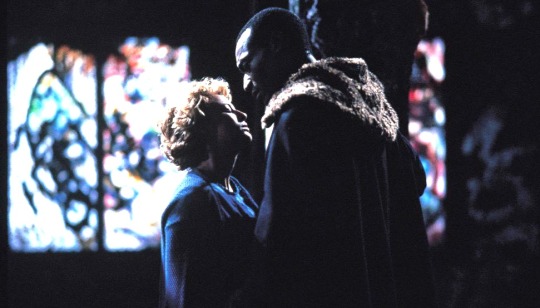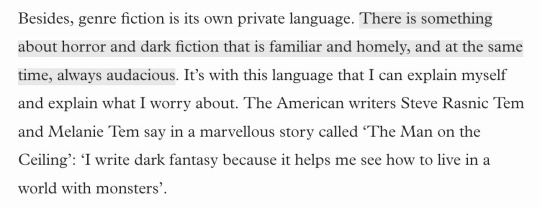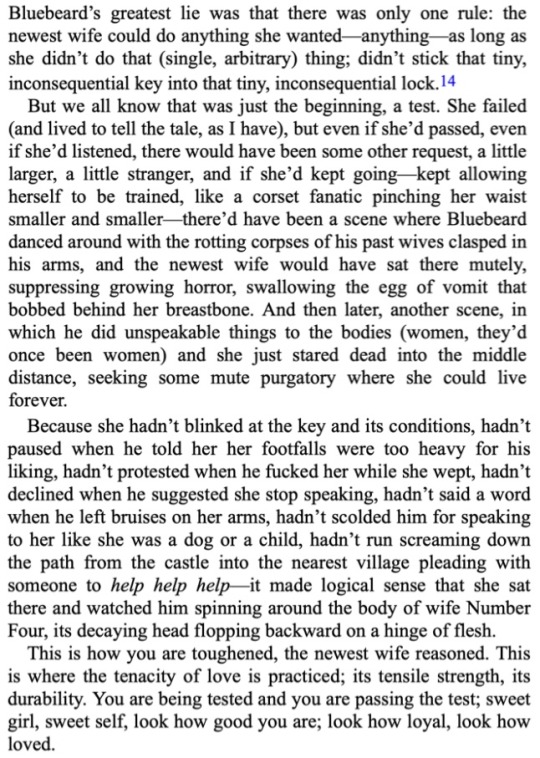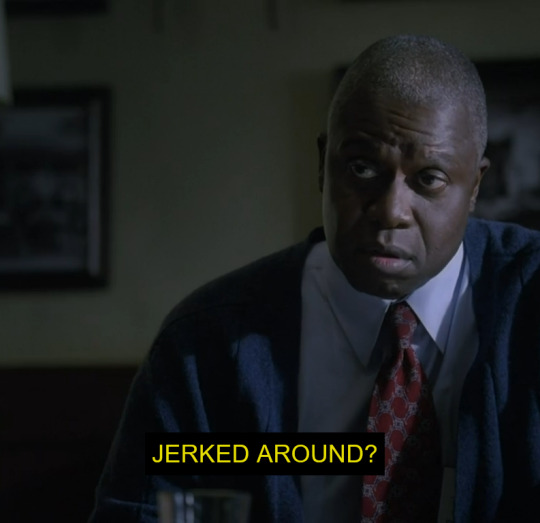#carmen maria machado
Explore tagged Tumblr posts
Text
You are embarrassed about your blood, its redness, the way it is just coming out of you with no concern for anyone's feelings. You are…embarrassed to be alive.
Carmen Maria Machado
#carmen maria machado#quotes#literature#writing#words#thoughts#prose#poetry#poesy#spilled ink#life quote#quoteoftheday#words to live by#good words
28 notes
·
View notes
Text










WRITERS + DIRECTORS ON THE POWER OF HORROR
Catriona Ward, interview for The Guardian Mark Gatiss, in A History of Horror (2010) Pascal Laugier, for Electric Sheep Candyman (1992), dir. Bernard Rose Colin Dickey, Ghostland Carmen Maria Machado, for Paris Review Kier-La Janisse, House of Psychotic Women Possession (1981), dir. Andrzej Żuławski Mariana Enríquez, ‘Notes on Craft’, Granta Guillermo del Toro, Haunted Castles, Dark Mirrors
#guillermo del toro#carmen maria machado#kier la janisse#possession#candyman#catriona ward#mariana enriquez#colin dickey#pascal laugier#mark gatiss#ana speaks#mine#my comparatives#quotes#horror#popular
3K notes
·
View notes
Note
Are all the themes in “in other lands” supposed to be a commentary on something? Or do you just like writing sex scenes between minors, age gaps, and reverse misogyny?
Genuine question.
Ohhh, my dear anon, I don't believe this is a genuine question.
But it does bring up something I've been meaning to talk about. So I'll take the bait.
Firstly. Yes, my work contains a commentary on the world around us. I wonder what I could be doing with the child soldiers being sexually active in their teens (people hook up right after battles), and the age gap relationship ending in the younger one being too mature for the elder. What could I possibly have been attempting when I said 'how absurd gender roles are, when projected onto people we haven't been accustomed by our own society to see that way'? I wasn't being subtle, that's for sure.
Secondly. Yes I do enjoy writing! I think I should, it's my life's work. Am I titillated by my own writing, no - though I think it's fine to be. The sex scenes of In Other Lands aren't especially titillating, to be honest. It is interesting to me how often people sneer at women for writing romance and sex scenes, having 'book boyfriends,' insinuating women writers fancy their own characters. Women having too much immoral fun! Whereas men clearly write about sex for high literary purposes.
… I have to say from my experience of women and men's writing, I haven't found that to be true.
I’m not in this to have an internet argument. Mostly people use bad faith takes to poke at others from the other side of a screen for kicks. But I do know some truly internalise the attitude that writing certain things is wrong, that anyone who makes mistakes must be shunned as impure, and that is a deeply Victorian and restrictive attitude that guarantees unhappiness.
I've become increasingly troubled by the very binary and extreme ways of thinking I see arising on the internet. They come naturally from people being in echo chambers, becoming hostile to differing opinions, and the age-old conundrum of wanting to be good, fearing you aren't, and making the futile effort to be free of sin. It makes me think of Tennyson, who when travelling through Ireland at the time of the Great Famine, said nobody should talk about the 'Irish distress' to him and insisted the window shades of his carriage be shut as he went from castle to castle. So he wouldn't see the bodies. But that didn't make the bodies cease to be.
In Les Mis, Victor Hugo explores why someone might steal, what that means about them and their circumstances, and who they might be - and explores why someone else is made terribly unhappy, and endangers others, through their own too rigid adherence to judgement and condemnation without pity. The story understands both Jean Valjean the thief and Javert the policeman. Javert’s way of thinking is the one that inevitably leads to tragedy.
Depiction isn't endorsement. Depiction is discussion.
Many of my loved ones have had widely varying relationships to and experience of sex (including 'none'). They've felt all different types of ways about it. If writing about them is not permissible, I close them out. I'd much rather a dialogue be open than closed.
I do understand the urge to write what seems right to others. I've been brain-poisoned that way myself. I used to worry so much about my female characters doing the wrong things, because then they'd be justly hated! Then I noted which of my writer friends had people love their female characters the most - and it was the one who wrote their female characters as screwing up massively, making rash and sometimes wrong decisions. Who wrote them as people. Because that's what people do. That's what feels true to readers.
I want my characters to feel true to readers. I want my characters to react in messy ways to imperfect situations. I love fantasy, I love wild action and I love deep thought, and I want to engage. That's what In Other Lands is about. That's even more what Long Live Evil is about. That sexy lady who sashays in to have sexy sex with the hero - what is her deal? Someone who tricks and lies to others - why are they doing that, how did they get so skilled at it? What makes one person cruelly judgemental, and another ignore all boundaries? What makes Carmen Maria Machado describe ‘fictional queer villains’ as ‘by far the most interesting characters’? What irritates people about women having a great time? What attracts us to power, to fiction, and to transgression?
I don’t know the answers to all those questions, but I know I want to explore them. And I know one more thing.
If the moral thing to do is shut people out and shut people up? Count me among the villains.
2K notes
·
View notes
Quote
Many people live and die without ever confronting themselves in the darkness.
Carmen Maria Machado, Her Body and Other Parties
#Carmen Maria Machado#motivation#quotes#poetry#literature#relationship quotes#writing#original#words#love#relationship#thoughts#lit#prose#spilled ink#inspiring quotes#life quotes#quoteoftheday#love quotes#poem#aesthetic
504 notes
·
View notes
Quote
Many people live and die without ever confronting themselves in the darkness.
Carmen Maria Machado, Her Body and Other Parties
#Carmen Maria Machado#motivation#quotes#poetry#literature#relationship quotes#writing#original#words#love#relationship#thoughts#lit#prose#spilled ink#inspiring quotes#life quotes#quoteoftheday#love quotes#poem#aesthetic
388 notes
·
View notes
Text

Carmen Maria Machado, from "Meat Eater No. 5" [ID'd]
#pauline i am obsessed w this#q#lit#quotes#poetry#typography#id included#carmen maria machado#dolor ante lucem#m#x
773 notes
·
View notes
Text
A tragedy in this from a queer perspective is that even if Carmilla was not a vampire here to turn Laura while sustaining on others, even if Laura's dreams were purely from her repressed desires and no biting, Laura was bound to get her heart broken. Eventually her darling friend would have to leave, and Laura is of marriageable age, to transition from being under a father's watch to be under a husband's. Carmilla would always need to sneak under a patriarch's nose regardless. A relationship between them or other women would almost be bound to stay in letters like a real 19th-century story Carmen Machado provided in the intro of the annotated version, of two women who ended up dying young. One of them describing her lover as "sunlight personified", and "She warmed me where I had only ever been cold. She took what was fallow and made it fruitful. I did not realise my soil was not salted."
151 notes
·
View notes
Text
Megan Fox in knitted leg warmers and short-shorts, a puffy coat and red fishnets, a color guard uniform, an Evil Dead raglan tee and star-spangled underwear, a cropped hoodie and low-rise jeans, an Edwardian prom dress with long white opera gloves. A wet strand of hair drawn through her mouth. Swimming naked in a lake glassy with twilight. Blackening the tip of her tongue with a lighter. In hunger, wan and beautiful as a consumptive heroine. Levitating. Snarling. Doe eyes, full and glossed lips. Dropping onto a car like a wild cat. Projectile vomiting an unctuous, inky liquid onto her best friend. Teeth like a nurse shark. A distended, disarticulated jaw like a python. Jennifer’s body on a sacrificial altar, sobbing. Jennifer’s body moving eerily from a great distance; then too close, and from the wrong angle. Jennifer pulling a rod out of her shish-kebabbed torso, saying, through a mouth of blood, “Do you have a tampon?” Jennifer’s body underlining the politics of Jennifer’s Body; a sex symbol through a funhouse mirror. (The film’s execs thought she’d be a draw for teenage boys, but teenage boys hated it. They didn’t know they were coming to be eaten. Not like that.)
Carmen Maria Machado, “Both Ways,” in It Came from the Closet: Queer Reflections on Horror (ed. Joe Vallese)
193 notes
·
View notes
Quote
Many people live and die without ever confronting themselves in the darkness.
Carmen Maria Machado, Her Body and Other Parties
#Carmen Maria Machado#motivation#quotes#poetry#literature#relationship quotes#writing#original#words#love#relationship#thoughts#lit#prose#spilled ink#inspiring quotes#life quotes#quoteoftheday#love quotes#poem#aesthetic
222 notes
·
View notes
Text
In her essay “Venus in Two Acts,” on the dearth of contemporaneous African accounts of slavery, Saidiya Hartman talks about the “violence of the archive.” This concept—also called “archival silence”—illustrates a difficult truth: sometimes stories are destroyed, and sometimes they are never uttered in the first place; either way something very large is irrevocably missing from our collective histories.
The word archive, Jacques Derrida tells us, comes from the ancient Greek ἀρχεῖον: arkheion, “the house of the ruler.” When I first learned about this etymology, I was taken with the use of house (a lover of haunted house stories, I’m a sucker for architecture metaphors), but it is the power, the authority, that is the most telling element. What is placed in or left out of the archive is a political act, dictated by the archivist and the political context in which she lives. This is true whether it’s a parent deciding what’s worth recording of a child’s early life or—like Europe and its Stolpersteine, its “stumbling blocks”—a continent publicly reckoning with its past. Here is where Sebastian took his first fat-footed baby steps; here is the house where Judith was living when we took her to her death.
Sometimes the proof is never committed to the archive—it is not considered important enough to record, or if it is, not important enough to preserve. Sometimes there is a deliberate act of destruction: consider the more explicit letters between Eleanor Roosevelt and Lorena Hickok, burned by Hickok for their lack of discretion. Almost certainly erotic and gay as hell, especially considering what wasn’t burned. (“I’m getting so hungry to see you.”)
The late queer theorist José Esteban Muñoz pointed out that “queerness has an especially vexed relationship to evidence…. When the historian of queer experience attempts to document a queer past, there is often a gatekeeper, representing a straight present.” What gets left behind? Gaps where people never see themselves or find information about themselves. Holes that make it impossible to give oneself a context. Crevices people fall into. Impenetrable silence.
[...] Consider: What is the topography of these holes? Where do the lacunae live? How do we move toward wholeness? How do we do right by the wronged people of the past without physical evidence of their suffering? How do we direct our record-keeping toward justice?
The memoir is, at its core, an act of resurrection. Memoirists re-create the past, reconstruct dialogue. They summon meaning from events that have long been dormant. They braid the clays of memory and essay and fact and perception together, smash them into a ball, roll them flat. They manipulate time; resuscitate the dead. They put themselves, and others, into necessary context.
In The Dream House, Carmen Maria Machado
154 notes
·
View notes
Quote
Many people live and die without ever confronting themselves in the darkness.
Carmen Maria Machado, Her Body and Other Parties
#Carmen Maria Machado#motivation#quotes#poetry#literature#relationship quotes#writing#original#words#love#relationship#thoughts#lit#prose#spilled ink#inspiring quotes#life quotes#quoteoftheday#love quotes#poem#aesthetic
171 notes
·
View notes
Text

- Carmen Maria Machado, In the Dream House
726 notes
·
View notes
Text

in the dream house - carmen maria machado
274 notes
·
View notes
Text
god okay so this quote by carmen maria machado from her memoir in the dream house -
“I had a room to myself as a kid, but my mother was always quick to point out that it wasn’t my room, it was her room and I was merely permitted to occupy it. Her point, of course, was that my parents had earned everything and I was merely borrowing the space, and while this is technically true I cannot help but marvel at the singular damage of this dark idea: That my existence as a child was a kind of debt and nothing, no matter how small, was mine. That no space was truly private; anything of mine could be forfeited at someone else’s whim."
- got me thinking about house likely not feeling ownership in his own home as a kid due to his dad's discipline methods, and the way he clings to his spaces as an adult (aka his apartment and his office)
and THEN it got me thinking about house getting kicked out of his and wilson's shared apartment in late season 6.
imagine, if you will. you're a kid with an abusive military father who makes it clear that you don't actually own anything and that you will only ever be a guest in his house. your father regularly takes away the roof over your head as a form of discipline. your father regularly violates your bodily autonomy by forcing you to take ice baths. your father's job means you spend your childhood moving from place to place without you having any say in the matter. your father shows you that even the food you eat is not an inherent right but a generous gift, and it can and will be taken away if you're late to the table.





so you grow up, and your spaces are really important to you. you stay in the same apartment and have the same office for years and years and you make both of them feel truly yours. they belong to you. no one can take them away from you anymore.
and then you make changes, painful ones. it's horrible and difficult and terrifying but it's worth it. and then your best friend offers you a new home, a space for you to share. together, the two of you make it yours. you live in a place that is owned by your best friend but it's nothing like living in the places owned by your dad. it's safe here. there's love here. this home belongs to both of you.


and then your best friend reconnects with his ex, and you're relegated to second place like you always are when there's a woman in his life, and he asks you to leave.




and you realize you had forgotten what it's like to be reminded that your home was never truly yours.

#swimming in the greg house childhood trauma swamp again#hilson#house md#late season 6 fucks me UP#john house#carmen maria machado#in the dream house#house season 6#op
94 notes
·
View notes
Text

loved in the dream house so much i ended up getting her body and other parties too!
#bookblr#books and reading#books#booklr#reading#book aesthetic#in the dream house#carmen maria machado#horror books#anthology#memoir#queer memoir#her body and other parties
132 notes
·
View notes
Quote
Many people live and die without ever confronting themselves in the darkness.
Carmen Maria Machado, Her Body and Other Parties
#Carmen Maria Machado#motivation#quotes#poetry#literature#relationship quotes#writing#original#words#love#relationship#thoughts#lit#prose#spilled ink#inspiring quotes#life quotes#quoteoftheday#love quotes#poem#aesthetic
601 notes
·
View notes